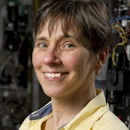Visualizing Our Microbial Ocean
- Speaker
-
 Heidi M. Sosik, Ph.D.Senior Scientist, Biology Department, Woods Hole Oceanographic Institution
Heidi M. Sosik, Ph.D.Senior Scientist, Biology Department, Woods Hole Oceanographic Institution
Presidential Lectures are a series of free public colloquia spotlighting groundbreaking research across four themes: neuroscience and autism science, physics, biology, and mathematics and computer science. These curated, high-level scientific talks feature leading scientists and mathematicians and are designed to foster discussion and drive discovery within the New York City research community. We invite those interested in these topics to join us for this weekly lecture series.
Diverse microscopic organisms dominate life in the ocean. Marine microbiomes are complex and highly dynamic, responding rapidly to their ever-changing fluid environment. They fuel marine food webs and contribute substantially to global scale productivity, nutrient cycling and climate regulation. Yet, many aspects of how the ocean’s microbial communities are structured and respond to change remain poorly understood, mainly because they are so challenging to observe in nature at relevant space and time scales. High throughput robotic microscopy and cytometry are now filling this gap, providing the capability to measure multi-decade species-specific time series and quantify impacts of microbial interactions such as phagotrophy, parasitism and symbiosis in the ocean.
In this Presidential Lecture, Heidi Sosik will highlight discoveries emerging from the combination of machine learning and billions of images of microbial ocean life.
